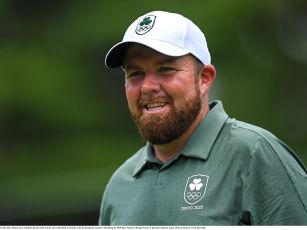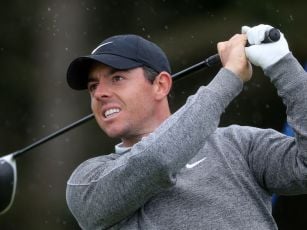With the Rio Olympics just a matter of weeks away, preparation for most athletes taking part (or hoping to take part) has been underway for quite some time.
For others, who are unfortunate enough to miss out on a spot in the Games of the XXXI Olympiad, they must now look four years down the road to Tokyo.
Many sports at the Games demand a certain level of fitness, and eight years can be a long time between the beginning of one Olympic-cycle and the end of the next.
That’s what makes golf in the Olympics so unique. As Padraig Harrington pointed out this week on Off The Ball, the career of a professional golfer can be 20 years.
The sport returns to the Games for the first time in 112 years and yet, unlike other sports in the Olympics, there hasn’t been a great clamber for athletes at the highest level to compete.
Adam Scott withdrew his name for consideration to represent his country - Australia - at the Games claiming it was something he “never aspired to do” and asserted that “it’s all about the four majors and I think that’s the way it should stay for golf.”
This seems to irk most people. A large proportion of those who compete at the Olympics see a gold medal as the pinnacle in their respective fields. Perhaps that’s down to the fact that they are amateur athletes, not professionals; they do not play their sport for monetary gain, but simply for the love of the sport, or to go down in history.
Many have full-time jobs that they balance with their training. For example, Irish gymnast Kieran Behan has gone through an incredibly difficult journey to be able to compete and represent his country at the Olympic Games.
His work, sacrifice and dedication as an amateur athlete is admirable in the extreme. His efforts should be commended.
This does not, however, mean that a professional golfer should be scorned for turning down the opportunity to represent their country at the Olympics.
The crux of the matter, I believe, is the fact that professional athletes are allowed to compete.
Golf is not alone in this regard - tennis, football and basketball all allow professionals to play at the Olympics - but these athletes don’t face as rigorous a schedule as golfers do.
The event itself takes place between the 11th and the 14th of August for men. As of Thursday, we were exactly six weeks from tee off.
In this period of time, there are already a WGC event (moved to facilitate the Games) and two major championships in the shape of The Open and the USPGA Championship.
Furthermore, this comes just two weeks after the US Open. A professional golfer competes 45 weeks in the year, so you’d have to imagine that much of the preparation that goes into their season is aimed in large part at this eight-week stretch.
When you break it down, 75% of the Majors available to be won in a calendar year take place in a six week period, as well as a World Golf Championship title.
These are what hold importance to a golfer. The four majors, to them, are the pinnacle of their sport.
In the build-up to the Open de France, four-time major winner Rory McIlroy said: "I've said to people I have four Olympic Games per year and that's my pinnacle. That's what I play for. That's what I'll be remembered for.
“Most other athletes dream their whole lives of competing in the Olympics or winning an Olympic gold. And we haven't. We dream of winning Claret Jugs and winning Green Jackets. Whether that makes golf look insular... that's just the way it is.”

As professionals, they’ve been training all their lives to claim a major trophy and not an Olympic gold. This may come down to the fact that golf has only just been reintroduced to the Olympics. No player alive today has ever even watched the sport at the Games, never mind dreamt of winning a gold medal.
This may change in years to come, but for the moment, the US Open, The Open, the USPGA Championship and The Masters will all be held in a higher regard.
Whether this would be different and the prestige of an Olympic gold be increased should the event be restricted to just amateur golfers remains to be seen. This may be something for the International Olympic Committee (IOC) to revise.
The other side to this discussion is the fact that many of the players have cited concerns over the Zika virus as their reason for pulling out of the Games.
The Zika virus is a mosquito borne virus (a certain type of mosquito called Aedes Aegypti) which can be contracted and present no symptoms in grown men or women.
In some instances it can cause Guillain-Barré syndrome, which can lead to paralysis. However, this symptom is not unique to the virus and can be caught otherwise and according to Professor Sam McConkey, head of the department of the international health and tropical medicine at the Royal College of Surgeons, it can be reversed “in most cases”.
The danger lies in its effect on pregnant women and children in utero. Scientists at the Centers for Disease Control and Prevention (CDC) concluded that the Zika virus is a cause of microcephaly and other severe fetal brain defects.
Microcephaly causes a child to be born with an abnormally small head and can lead to intellectual disability in later life. The virus, it has been found, can be transmitted sexually and can be passed onto females via the male sperm.
Many golfers, such as Shane Lowry, Rory McIlroy and Jason Day, have all decided against travelling to Brazil for fear of contracting the virus. I feel it’s important to point out at this time that the virus is not restricted to Brazil, and the number of cases have dropped in recent weeks from thousands per week in January, February and March, to just hundreds.

This has come down to the fact that it is now winter time in Brazil and mosquitoes do not thrive in the cold weather. Furthermore, the government has been trying to prevent the spread of the virus.
What Day, Lowry and McIlroy all have in common is that they are young men who are all married (or yet to be married) with aspirations of starting a family of their own. In Jason Day’s case, he may be looking to continue his young family.
In his statement detailing why he would be removed from consideration for the Olympics, Lowry said: “Based on a number of consultations with leading medical experts in recent days, I feel I would be putting my family's health at risk by being in Brazil at the current time.
“Wendy [Honner, his wife] and I have just got married and have just recently been married and we hope to be lucky enough to start a family in the near future.”
As Padraig Harrington pointed out, you have to be seen to put your family first. However sceptical people will want to be, these are young men who are married and looking to start families.
This is a relatively new virus. Vaccines are still being produced to fight it, with one as recently as this week found to be successful on mice.
Harrington will likely represent Ireland at the Olympics and he himself admitted he is looking forward to the Games. Bubba Watson may also go on to represent the US, but he and his wife adopted two children after being told they could not conceive.
The women who will be representing their countries at the Olympics know the risks and the consequence, but few of them have decided to pull out.
Lee-Anne Pace of South Africa became the first female golfer to withdraw from the Games citing Zika and said: "I hope that everyone can understand that this was a very difficult decision to come to," she said. "However my health and my future family’s health must come first.”
Hey everyone. I would like to announce with huge disappointment that I will unfortunately not be competing in Rio. pic.twitter.com/H1SzBJN7Xe
— Lee-Anne Pace (@LeeAnnePace) 29 June 2016
Rory McIlroy’s fiancee isn’t competing for a gold medal at the Olympics, but should he contract the virus (as unlikely as it may seem), she may be exposed to the risk.
Regardless of the many who take these excuses with a pinch of salt, or that they are using this virus to their advantage so they can compete when it suits them, this should not be shouldered by the golfers.
It is up to the IOC to restrict the event to amateur golfers, so that the prestige increases and the gold medal isn’t so easily cast aside in the eyes of many. The reality is that Majors will still be held in the highest regard for professionals. That’s the way it is, for now.
As for the virus, put yourself in their shoes, and weigh up the costs against the benefits; will it increase your sponsorship revenue? Will it cost you a Major? Are you willing to potentially contract the virus for an award that many will doubt you even place any importance upon?
Download the brand new OffTheBall App in the Play Store & App Store right now! We've got you covered!
Subscribe to OffTheBall's YouTube channel for more videos, like us on Facebook or follow us on Twitter for the latest sporting news and content.








